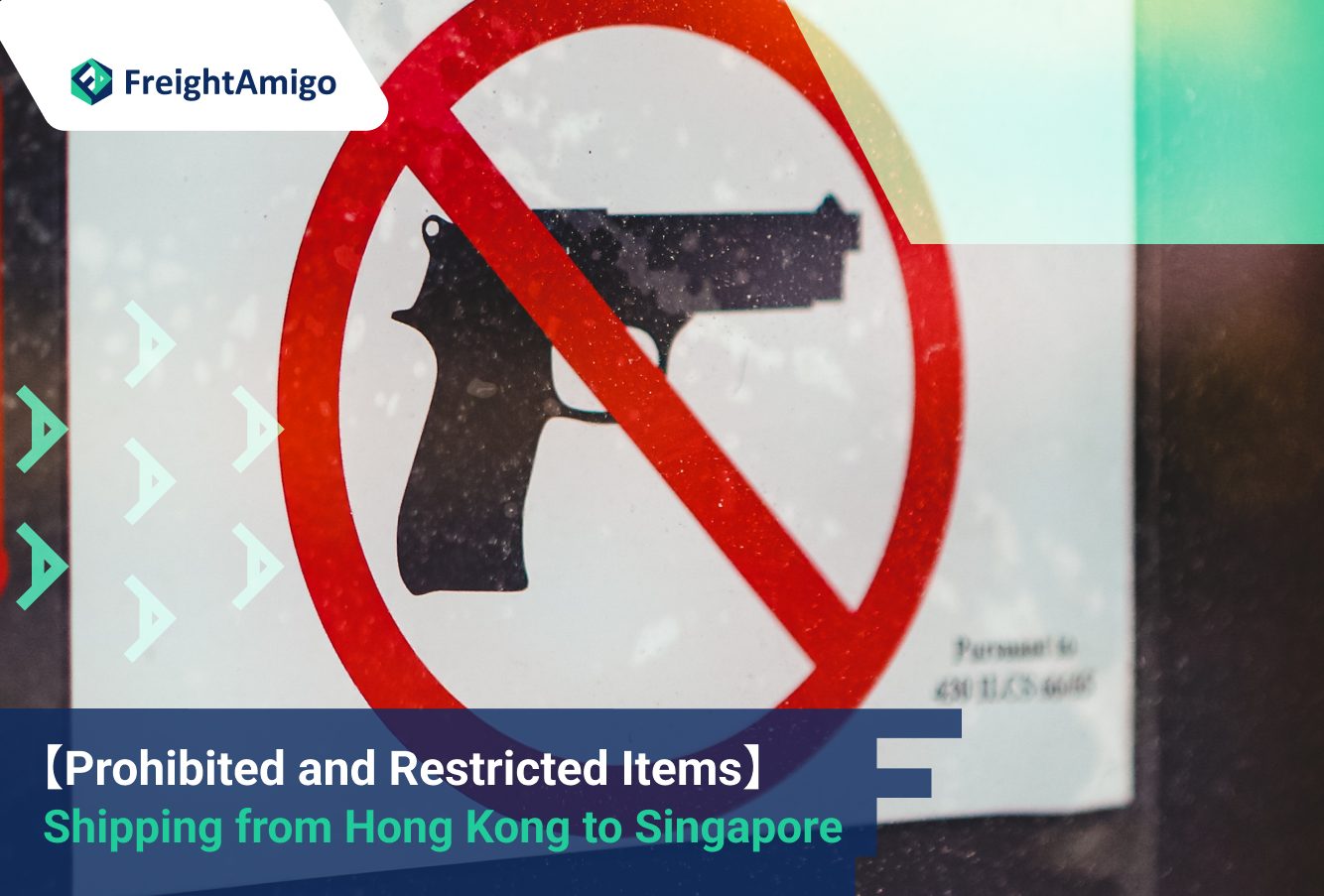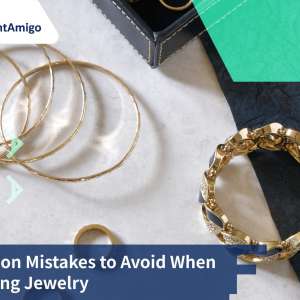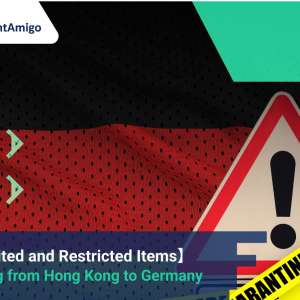In the bustling world of international trade, shipping goods from one country to another is a common practice. However, it’s essential to be aware of the regulations and restrictions in place to ensure a smooth and lawful process. When it comes to shipping from Hong Kong to Singapore, there are specific rules regarding prohibited and restricted items that businesses and individuals need to adhere to. In this comprehensive guide, we will explore the intricacies of shipping prohibited and restricted items from Hong Kong to Singapore, providing valuable insights and practical advice.
Latest update on 21 February, 2024 by Caspian Ng– Marketing Analyst at FreightAmigo
Want to compare the best Express, Air Freight, Sea Freight, Rail Freight & Trucking rates so as to have better control on cost?
Understanding Prohibited and Restricted Goods
In Singapore, the government has established clear guidelines regarding controlled goods, categorizing them into two main types: restricted and prohibited. Restricted goods are partially banned and may require additional permits or approvals from the Competent Authorities (CAs) before they can be imported into Singapore. These CAs oversee various aspects of trade, such as the National Parks Board, which governs the flow of wildlife products, and the Info-communications Media Development Authority of Singapore, which restricts the import of certain telecommunication equipment.
On the other hand, prohibited goods are strictly illegal to import and export. These items include illegal drugs, firearms, and firecrackers. It is crucial to familiarize yourself with the list of prohibited goods to avoid any legal complications or penalties. The Competent Authorities responsible for regulating prohibited goods in Singapore are the Arms & Explosives Division, General Licensing Division, Police Licensing & Regulatory Department, Singapore Police Force, Singapore Customs, and the National Parks Board.
To provide a clearer understanding, let’s take a closer look at some examples of prohibited goods and their respective Competent Authorities:
Prohibited Goods | Competent Authority |
Chewing gum (excluding Health Sciences Authority approved oral dental and medicinal chewing gum) | Singapore Customs |
Pistol or revolver-shaped cigarette lighters, Firecrackers | Arms & Explosives Division, General Licensing Division, Police Licensing & Regulatory Department, Singapore Police Force |
Rhinoceros horn (worked, unworked, or prepared and any part, power, or waste of such horn), Endangered species of wildlife and products derived from the body of such animals | National Parks Board |
Imitation tobacco products (electronic cigarettes, vaporizers) and components of imitation tobacco products, Smokeless cigars, smokeless cigarillos, or smokeless cigarettes, Any product containing nicotine or tobacco that may be used topically for application, by implant or injected into any parts of the body, Any solution or substance, of which tobacco or nicotine is a constituent, that is intended to be used with an electronic nicotine delivery system or vaporizers, Nasal snuff, Oral snuff | Tobacco Regulation Branch, Health Sciences Authority |
Controlled drugs listed under the 4th Schedule of Misuse of Drugs Regulation | Health Products Regulation Group, Health Sciences Authority |
It is essential to note that this is not an exhaustive list, and it is advisable to consult the relevant Competent Authorities or refer to official government sources for the most up-to-date and comprehensive information on prohibited goods.
Differentiating Prohibited and Restricted Goods
Understanding the distinction between prohibited and restricted goods is crucial for compliance with customs regulations. Prohibited goods are strictly forbidden for import and export, while restricted goods may be imported under certain conditions with the necessary approvals from the Competent Authorities. It is essential to obtain the appropriate permits and licenses for restricted goods to ensure a smooth and lawful shipping process.
Exploring Restricted Goods
Restricted goods require importers to obtain specific permits or approvals from the Competent Authorities before they can be imported into Singapore. The exact licensing requirements vary depending on the nature of the goods and the respective Competent Authorities overseeing their regulation.
To determine if a particular item is subject to control, importers can refer to the description of the goods, Harmonized System (HS) code, or CA product code via the HS/CA Product Code Search Engine. This search engine provides detailed information on the licensing requirements and contact information of the relevant Competent Authorities.
It is crucial to note that the list of restricted goods is extensive and covers a wide range of products. Some examples of goods that may be subject to import restrictions include:
- Controlled and regulated chemicals
- Hazardous substances
- Pharmaceuticals and medical devices
- Agricultural products
- Food items
- Telecommunication equipment
To ensure compliance with the regulations, importers should undertake thorough research and consult with the relevant Competent Authorities to determine the specific licensing requirements for their goods.
Understanding Strategic Goods
In addition to prohibited and restricted goods, there is a separate category of goods known as strategic goods. Strategic goods encompass items and related technologies that can be used to produce weapons of mass destruction and missiles capable of delivering such weapons. These goods include arms, military equipment, and commercial items that have the potential to be used in the development of weapons of mass destruction.
The Strategic Goods Control Act (SGCA) governs the export, transfer, and brokerage of strategic goods listed in the Strategic Goods Control List. Traders dealing with strategic goods must comply with the regulations outlined in the SGCA and obtain the necessary permits and licenses.
To export, transfer, or broker strategic goods, traders must apply for a strategic goods permit. The permit can be obtained through Singapore Customs under the Strategic Trade Scheme (STS). Traders may apply for an individual permit or a bulk permit, depending on their business needs.
It’s important to note that exporting strategic goods requires careful adherence to customs procedures. Traders with approved STS licenses/permit numbers can work with logistics providers like DHL Express to facilitate the necessary Tradenet permit application. The goods and Tradenet permit will undergo inspection by Customs officers before entering the Changi Airfreight Centre.
For a comprehensive understanding of strategic goods, it is advisable to consult the List of Military Goods and the List of Dual-Use Goods. These lists provide detailed information on the specific goods and technologies classified as strategic.
Conclusion
Shipping prohibited and restricted items from Hong Kong to Singapore requires a thorough understanding of the regulations and compliance with customs procedures. By familiarizing yourself with the Competent Authorities responsible for overseeing the import and export of controlled goods, you can ensure a smooth and lawful shipping process.
Remember to consult the relevant Competent Authorities or refer to official government sources for the most up-to-date and comprehensive information on prohibited, restricted, and strategic goods. By partnering with a trusted logistics provider, businesses can navigate the complexities of customs regulations and enjoy a seamless shipping experience.
There are different options for cargo transportation. If you want to choose the most convenient and suitable solution, it is best to have the full support of logistics experts! If you are planning to transform your warehouse operations, please go to the FreightAmigo page for inquiries.
Read More:
Shipping from Hong Kong to Singapore | FreightAmigo
Duties & Taxes For Shipping From Hong Kong To Singapore
Prohibited and Restricted Items: Shipping from Hong Kong to Vietnam
Navigating the Asian Market: Maximizing Profit with Strategic Imports from Southeast Asia
If you have any inquiries on logistics/supply chain, feel free to contact FreightAmigo now:
Chat with us online | Hotline: +852 28121686 | WhatsApp: +852 27467829









































